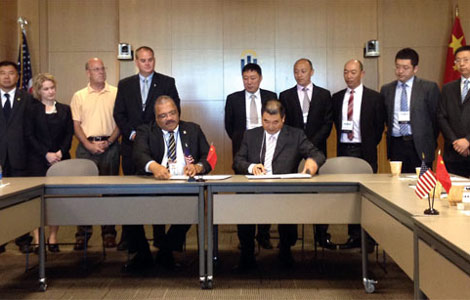Revision of decree protects military airports
Updated: 2014-07-28 20:37
By Zhao Shengnan
|
||||||||
A revised law on protecting military facilities, due to be promulgated on Aug 1, will ensure better security for military airports, more than half of which are obstructed by high buildings overlooking the perimeter.
Height restriction violations have contributed to about 100 flight accidents over the past two decades, Xinhua News Agency quoted military authorities as saying.
The problem has become so severe that more than 10 military airports have had to be relocated or closed, according to the General Staff Headquarters of the People's Liberation Army.
Observers have welcomed the revised law, which forbids the construction of high buildings in military airport reserve zones.
They also called for local governments and the public to be aware of national defense needs amid China's rapid urbanization.
Air safety has been in the global spotlight in recent week after a series of crashes.
In China, more than 1,000 buildings have been found to have breached height restrictions in airport reserve zones, with some of them more than 300 meters higher than permitted, according to the General Staff Headquarters.
Residential activity is also a factor, with pet pigeons and small remotely controlled planes potentially endangering aircraft.
Ma Yifei, an officer at the headquarters, said violations were largely due to the inability of local governments to balance the demands of economic development and national defense.
Wen Bin, a researcher at the PLA's Academy of Military Sciences, said local authorities should not sacrifice national defense for GDP growth through expanding urbanization.
In cases of emergency, military planes may have to detour from their flight paths but the buildings could mean that access to a runway by another approach is blocked, Wen said.
High buildings near an airfield mean that any crash could have a potentially higher death toll, he added.
Apart from the danger to aircraft, even activities such as kite-flying have a deadly potential, while plane-watchers in nearby buildings could gain sensitive information and post it on the Internet.
The PLA Daily last week posted pictures on its website highlighting the security problems near military bases.
One picture showed a home with just one wall separating it from a military arsenal. Another showed that the high wall of a building was obviously in a position that could interfere with a base's radar.
In June, the top legislature passed the revised law, which was originally adopted in 1990, after inspections revealed safety and security risks earlier this year.
The new law clearly defines a "military forbidden zone" and "military management zone".
Xinhua contributed to this story.
zhaoshengnan@chinadaily.com.cn

 Silicon Valley rally calls on Fox News to fire Beckel
Silicon Valley rally calls on Fox News to fire Beckel
 Look who's two, Xiao Liwu!
Look who's two, Xiao Liwu!
 Philadelphia Orchestra meets the press
Philadelphia Orchestra meets the press
 Chinese, US naval hospital ships conduct exchange
Chinese, US naval hospital ships conduct exchange
 High rent pressures NYC Asian eateries
High rent pressures NYC Asian eateries
 Artists advocate for environmental protection
Artists advocate for environmental protection
 Wichita, Kansas to Xi'an, China: Come fly with us
Wichita, Kansas to Xi'an, China: Come fly with us
 Amateur team aims for great heights
Amateur team aims for great heights
Most Viewed
Editor's Picks

|

|

|

|

|

|
Today's Top News
Ex-security chief Zhou Yongkang under probe
Microsoft probed for monopoly
4 charged for murdering student
Prudence urged over solar dispute
Baidu developing 'self-driving' car
US visa delays likely to continue
McDonald's fishing for supplier
OSI group to fund food safety
US Weekly

|

|






